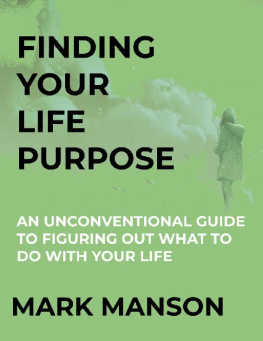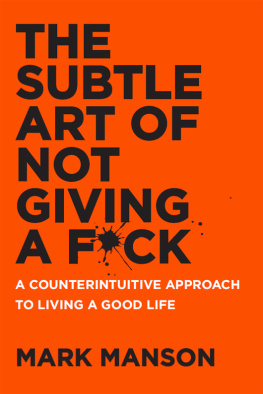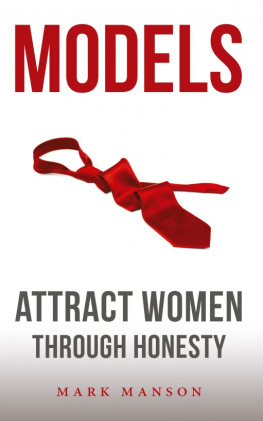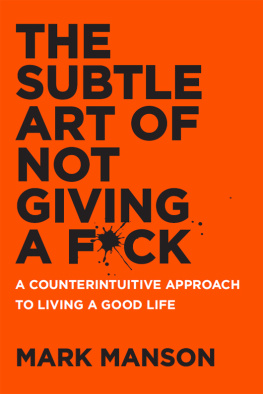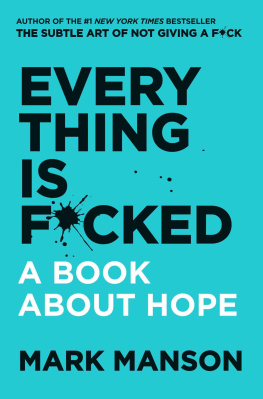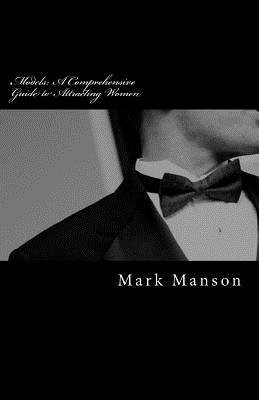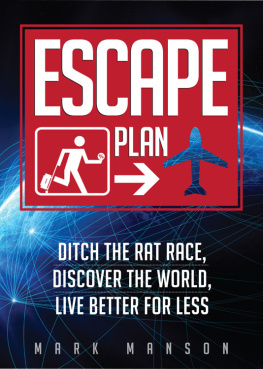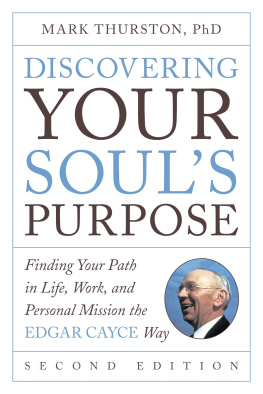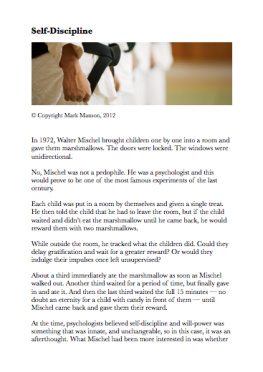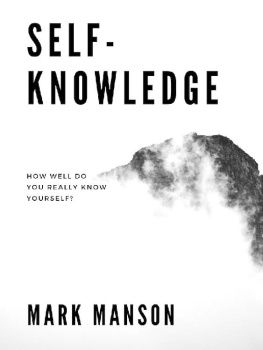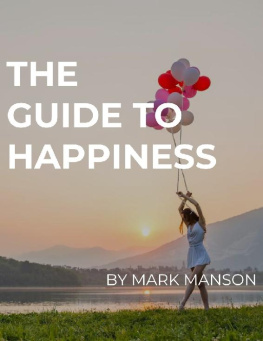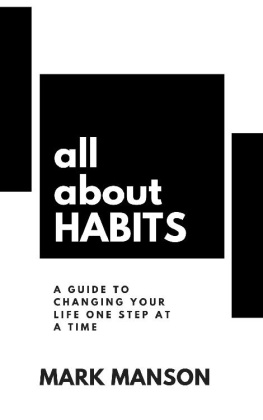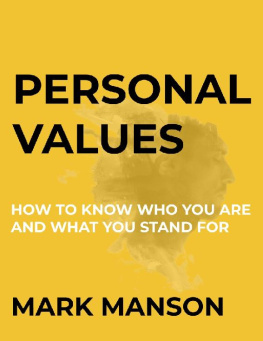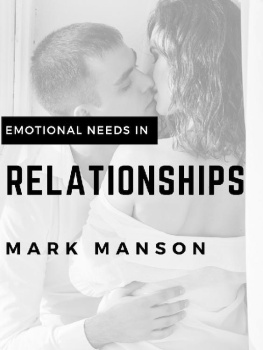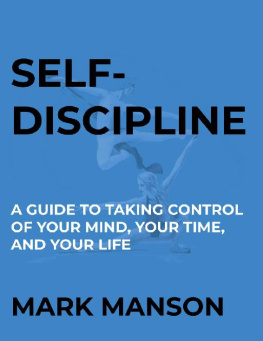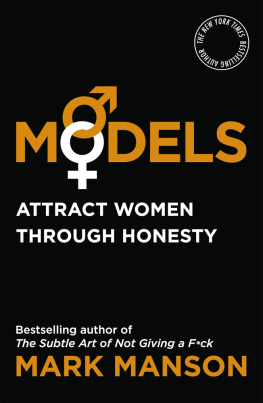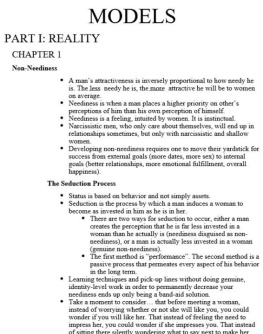Mark Manson - Finding Your Life Purpose: an Unconventional Guide to Figuring Out What to Do With Your Life
Here you can read online Mark Manson - Finding Your Life Purpose: an Unconventional Guide to Figuring Out What to Do With Your Life full text of the book (entire story) in english for free. Download pdf and epub, get meaning, cover and reviews about this ebook. year: 2019, genre: Romance novel. Description of the work, (preface) as well as reviews are available. Best literature library LitArk.com created for fans of good reading and offers a wide selection of genres:
Romance novel
Science fiction
Adventure
Detective
Science
History
Home and family
Prose
Art
Politics
Computer
Non-fiction
Religion
Business
Children
Humor
Choose a favorite category and find really read worthwhile books. Enjoy immersion in the world of imagination, feel the emotions of the characters or learn something new for yourself, make an fascinating discovery.
- Book:Finding Your Life Purpose: an Unconventional Guide to Figuring Out What to Do With Your Life
- Author:
- Genre:
- Year:2019
- Rating:4 / 5
- Favourites:Add to favourites
- Your mark:
- 80
- 1
- 2
- 3
- 4
- 5
Finding Your Life Purpose: an Unconventional Guide to Figuring Out What to Do With Your Life: summary, description and annotation
We offer to read an annotation, description, summary or preface (depends on what the author of the book "Finding Your Life Purpose: an Unconventional Guide to Figuring Out What to Do With Your Life" wrote himself). If you haven't found the necessary information about the book — write in the comments, we will try to find it.
Finding Your Life Purpose: an Unconventional Guide to Figuring Out What to Do With Your Life — read online for free the complete book (whole text) full work
Below is the text of the book, divided by pages. System saving the place of the last page read, allows you to conveniently read the book "Finding Your Life Purpose: an Unconventional Guide to Figuring Out What to Do With Your Life" online for free, without having to search again every time where you left off. Put a bookmark, and you can go to the page where you finished reading at any time.
Font size:
Interval:
Bookmark:
MARKMANSON.NET
2019
Mark Manson
If youre reading this, then youre lucky enough to even have the option of asking yourself, What should I do with my life? Whats my purpose here on Earth?
Think about it: for the vast majority of human history, meaning and purpose were forged by banding together in tight-knit communities with the sole aim of delaying collective death by a few extra years.
Humans probably didnt sit around and over analyze whether they should dedicate their lives to making buckskin loin cloths or better arrowheads or gathering more berries. Life may have been short and brutal, but it was simple: just do whatever needs to be done to stay alive.
But over time, being the smart little fuckers that we are, we figured out how to eliminate a lot of awful ways to die. We then turned our ingenuity to figuring out a lot of ways to make ourselves healthier, more comfortable, more entertained, and so on.
And while this progress has created innumerable benefits for our species, its also left us wondering what the hell were supposed to do with all this time that used to be spent foraging for nuts and finding a nice tree to sleep under.
And because of this, most of us have no clue what we want to do with our lives. Even after we finish school. Even after we get a job. Even after were making money.
Between ages 18 and 25, I changed career aspirations more often than I changed my underwear. And even after I had a business, it took another four years to clearly define what I wanted for my life.
Chances are, youre like me and have no clue what you want to do.

Its a struggle almost every adult goes through. What do I want to do with my life? What am I passionate about? What do I not suck at? I often receive emails from people in their 40s and 50s who still have no clue what they want to do with themselves.
Part of the problem is the concept of life purpose itselfthe idea that we were each born for some higher purpose and its now our cosmic mission to find it. As I said, its actually a modern luxury to even be able to consider what we should do with our lives.
Heres the truth. We exist on this earth for some undetermined period of time. During that time we do things. Some of these things are important. Some of them are unimportant . And those important things give our lives meaning and happiness . The unimportant ones basically just kill time.
So when people say, What should I do with my life? or What is my life purpose? what theyre actually asking is: What can I do with my time that is important?
This is an infinitely better question to ask. Its far more manageable and it doesnt have all of the ridiculous baggage that the life purpose question does. Theres no reason for you to be contemplating the cosmic significance of your life while sitting on your couch all day eating Doritos. Rather, you should be getting off your ass and discovering what feels important to you.
One of the most common email questions I get is people asking me what they should do with their lives, what their life purpose is. This is an impossible question for me to answer. After all, for all I know, this person is really into knitting sweaters for kittens or filming gay bondage porn in their basement. I have no clue. Who am I to say whats right or whats important to them?
Well get to the specifics of how you can figure that out soon, but first, you and me, we need to have a talk. We need to get on the same page about a few things like the role of passion in all of this, about the value of pain and being uncomfortable, and even about your death.
And thats where well start: your death.
Were all going to die, all of us. What a circus! That alone should make us love each other, but it doesnt. We are terrorized and flattened by trivialities; we are eaten up by nothing.
- Charles Bukowski
Yes, were all going to die. You and me and everyone else. One day, eventually, that fateful moment will come calling and take us all away.
When we die isnt even really the interesting question, as once youre dead you wont be around to care about what you did or didnt do.
No, the interesting question is how we die. Will it be cancer? Cardiac arrest? Anthrax attack? Choking on a pretzel?
Me? Im holding out for parachute failure. Or maybe a plane crash.
OK, not really, but sometimes when Im on a plane , and were landing and theres terrible weather, I start daydreaming about what a crash would be likethe oxygen masks falling, women shrieking, babies crying; maybe Id reach across the aisle and hold a total strangers hand in a final dramatic gesture as we wait for the inevitable together. The earth would sweep upon us and together wed be slammed into eternity.
Luckily that hasnt happened yet. But its exciting to think about.
When we think about our own deaths we typically think about the final moments. The hospital beds. The crying family. The ambulances. We dont think about the long string of choices and habits which lead to those final moments.
You could say that our death is a work-in-progress over the course of our lives each breath, each bite, each swallow, each late night and missed traffic light, each laugh and scream and cry and crashing fist and lonely sighthey each bring us one step closer to our own dramatic denouement from this world.
So the better question isnt when youre going to die. Its what are you choosing as your vehicle to get there? If everything you do each day brings you closer to death in its own unique and subtle way, then what are you choosing to let kill you?
The author and poet Charles Bukowski once said Find what you love and let it kill you.
Bukowski was a shameless drinker, womanizer, and all-around fuck up. He would get drunk on stage at his poetry readings and verbally abuse his audience. He gambled a lot of his money away and had an unfortunate habit of exposing himself in public.
But underneath Bukowskis disgusting exterior was a deep and introspective man with more character than most.
Bukowski spent most of his life broke, drunk, and getting fired from various jobs. Eventually, he ended up working in a post office filing letters. All his life he wrote fruitlessly, a total unknown and a loser. He wrote for almost 30 years before finally getting his first book deal. It was a meager deal. When accepting it, he wrote, I have one of two choicesstay in the post office and go crazy or stay out here and play at writer and starve. I have decided to starve.

Charles Bukowski. Image Bukowski.net
In my opinion, the honesty in his writinghis fears, failures , regrets , self-destruction, emotional dysfunction it is unparalleled. He will tell you the best and worst of himself without flinching, without shifting his eyes or even muttering a sorry about that as an afterthought. He wrote about both shame and pride without qualification. His writing was equanimousa silent embrace of the horrible and beautiful man that he was.
And what Bukowski understood, which most people dont, is that the best things in life can sometimes be ugly. Life is messy, and were all a little screwed up in our own special snowflake kind of way. He never understood the baby boomer obsession with peace and happiness or the idealism that came along with it. He understood that you dont get one side without the other. You dont get love without pain . You dont get meaning and profundity without sacrifice.
Next pageFont size:
Interval:
Bookmark:
Similar books «Finding Your Life Purpose: an Unconventional Guide to Figuring Out What to Do With Your Life»
Look at similar books to Finding Your Life Purpose: an Unconventional Guide to Figuring Out What to Do With Your Life. We have selected literature similar in name and meaning in the hope of providing readers with more options to find new, interesting, not yet read works.
Discussion, reviews of the book Finding Your Life Purpose: an Unconventional Guide to Figuring Out What to Do With Your Life and just readers' own opinions. Leave your comments, write what you think about the work, its meaning or the main characters. Specify what exactly you liked and what you didn't like, and why you think so.

